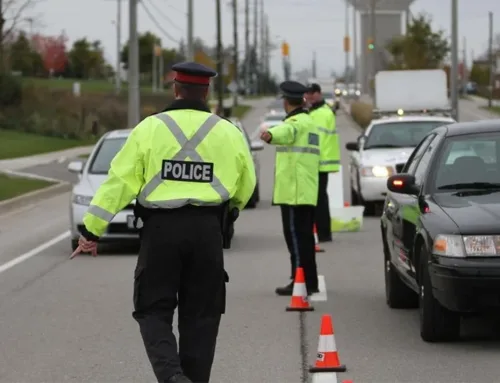In the mosaic of legal obligations that come to light after a vehicular incident, few carry as much weight and potential for long-term repercussions as the duty to remain at the scene of an accident. This duty is not only a legal requirement but also a measure of one’s commitment to civic responsibility and ethical conduct. In Ontario, a breach of this duty, commonly referred to as ‘fail to remain,’ triggers a cascade of serious consequences that can ripple through every facet of an individual’s life. Understanding what constitutes a ‘fail to remain’ offence, the gravity of its impact on one’s legal and driving record, and the intricacies of navigating the aftermath, is crucial for every driver traversing the roads of Ontario.
In the ensuing discourse, we endeavour to elucidate the nuances of ‘fail to remain’ offences, shedding light on the legal interpretations, the penalties imposed by the justice system, and the imperatives of responsible conduct in the wake of a collision. Moreover, we shall explore the recourse available to those charged under these statutes, providing a compass for steering through the legal complexities that such a charge entails.
What Are Fail to Remain Offences?
In the province of Ontario, the term ‘fail to remain’ is not merely an informal reference to leaving the scene of a vehicular collision but a serious legal charge defined under the Highway Traffic Act (HTA) and, in certain grave instances, under the Criminal Code of Canada. This classification encompasses the full scope of a driver’s responsibilities immediately following an accident. It is a legal directive mandating the involved parties to halt their vehicles, engage in an exchange of information, assist those who may have sustained injuries, and notify the proper authorities. The pertinent statutes are constructed to uphold the principles of accountability, ensure the provision of necessary medical attention, and facilitate the orderly flow of traffic post-incident.
Legal Consequences
The spectrum of legal outcomes for failing to remain offences can be broad, each reflecting the gravity of the offence and the circumstances surrounding it.
Failure to Stop at the Scene of an Accident
Under Section 252 of the Criminal Code of Canada, which parallels similar directives in the HTA, the legal expectation set forth is unequivocal: any individual who has knowledge of being involved in an accident is obligated to stop their vehicle. This legal duty extends beyond merely pausing at the scene; it encompasses cooperating with authorities, providing relevant documentation, and participating in subsequent legal procedures. The imperativeness of this action cannot be overstated, as it forms the foundation for a fair and thorough investigative process.
Failure to Provide Information
The legal protocol following a collision necessitates that all parties involved exchange vital information. This includes but is not limited to, the sharing of names, addresses, driver’s license numbers, and insurance details. Such information is crucial for the facilitation of insurance claims and legal proceedings that may follow.
Failure to Render Assistance
When an accident occurs, there is a legal and ethical onus on individuals to offer assistance to those who are injured. This may mean administering first aid, contacting emergency services, or ensuring that the injured party is not left alone until help arrives. This requirement is a testament to the societal expectation of mutual assistance in times of crisis.
Failure to Report an Accident
There is an additional requirement to report any accident that results in injury, death, or significant property damage to the police. The failure to report such an accident not only infringes on the legal process but can also hinder the delivery of justice and compensation to those affected.
Penalties For Failure to Remain at the Scene of an Accident
Fines
Penalties for this offence include fines that can be a significant financial burden. In Ontario, the courts are empowered to levy fines that reflect the severity of the offence, with the understanding that the penalty should serve as a deterrent to the offender and the public at large.
Demerit Points
Ontario’s demerit points system assigns seven points for a failure to remain violation, underscoring the severity with which this offence is viewed. Accumulating these points can lead to further sanctions, including interviews and potential suspension of driving privileges.
Driver’s License Suspension
The implications for a driver’s license following a conviction for failing to remain are significant. Depending on the specific circumstances, the suspension period may vary, but it serves as a punitive and rehabilitative measure.
Driving Record
An individual’s driving record is a reflection of their behaviour on the road. A notation of failing to remain is a serious blemish that can have long-term repercussions, affecting insurance premiums and employment opportunities within industries that prioritize clean driving records.
Imprisonment
In instances where the offence reaches the threshold of criminality, custodial sentences are a real possibility. This outcome signifies society’s condemnation of the failure to remain offence and serves as a sombre reminder of its potential consequences.
Insurance Implications
Insurance implications of failing to remain at the scene are considerable. Conviction can lead to an increase in premiums or outright refusal of coverage by insurers, as the driver will now be categorized as high-risk.
Responsible Behavior on the Road
Stopping at the Scene
The imperative of stopping at the scene of an accident cannot be overemphasized. It is the first step in a chain of legal and moral duties that ensure the well-being of all involved parties and the integrity of the judicial process.
Providing Information
Exchanging accurate and comprehensive information after an accident not only facilitates a smoother insurance claim process but also supports transparency and accountability, both of which are cornerstones of the justice system.
Offering Assistance
The moral fibre of society is often measured by the willingness of its members to help one another. Offering assistance in the aftermath of an accident is a legal requirement that upholds this societal value.
Reporting the Accident
The act of reporting an accident serves a multitude of purposes. It ensures that the incident is documented officially, aids in the insurance adjudication process, and upholds public safety by enabling the appropriate allocation of resources to manage and investigate the scene.
How to dispute a charge of failure to remain at the scene of an accident in Ontario?
Disputing a charge of failing to remain at the scene of an accident requires a thorough understanding of the legal framework and strategic planning. Here is a detailed approach to contesting such charges in Ontario:
- Immediate Response Post-Incident:
Immediately after the incident, if you believe you may face charges, it’s crucial to:
- Document Everything: Take pictures of the scene, your vehicle, and any relevant landmarks or street signs.
- Seek Witnesses: If there are any witnesses, get their contact information. They could provide crucial testimony that supports your version of events.
- Legal Representation:
Upon being charged, it’s essential to:
- Engage Legal Counsel: Contact a paralegal firm with a dedicated focus on traffic-related offenses. They understand the nuances of the Provincial Offences Act and Highway Traffic Act.
- Do Not Admit Fault: It’s important not to make any statements that could be construed as an admission of guilt until you have legal representation.
- Gathering Evidence:
Your legal representative will assist in:
- Collecting Evidence: This includes gathering any surveillance footage, dash-cam videos, or GPS data that can substantiate your whereabouts and actions during the incident.
- Expert Witnesses: In some cases, it may be necessary to involve accident reconstruction experts or other specialists to support your defense.
- Pre-trial Proceedings:
Before the trial, there will be several steps:
- Disclosure Review: Your legal representative will review the prosecution’s evidence and identify any procedural errors or inconsistencies.
- Legal Motions: If your rights were violated during the investigation or arrest, your representative might file motions to exclude certain evidence or to dismiss the charges altogether.
- Plea Bargaining:
In some situations, it may be best to:
- Negotiate a Plea: Your paralegal may negotiate with the prosecutor to reduce the charges or penalties in exchange for a guilty plea to a lesser offence.
- Trial Strategy:
If your case goes to trial, your defense strategy may include:
- Challenging the Prosecutor’s Case: Cross-examine the prosecution’s witnesses and challenge the validity of the evidence.
- Presenting a Defense: Introduce your evidence, including witness testimony, to provide an alternative narrative to the prosecution’s charges.
- Sentencing and Appeals:
If convicted, there are still options:
- Sentencing Mitigation: Present factors in your favour that could reduce the severity of the penalty.
- Appeal Process: If there were legal errors that affected the outcome, your paralegal could file an appeal to a higher court.
Conclusion
Successfully disputing a fail to remain charge is a complex process that benefits greatly from the guidance of experienced paralegal familiar with Ontario’s traffic laws. Through careful evidence review, strategic legal maneuvers, and effective court representation, it is possible to challenge the prosecution’s case and seek a favourable outcome. Traffic Paralegal Services offers the depth of knowledge and strategic advocacy necessary to navigate these charges, always upholding the highest standards of legal excellence and client representation.







Leave A Comment
You must be logged in to post a comment.